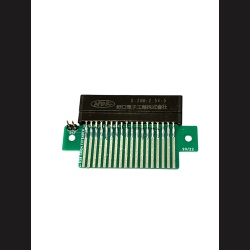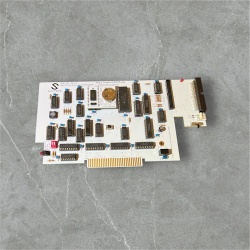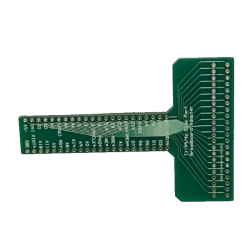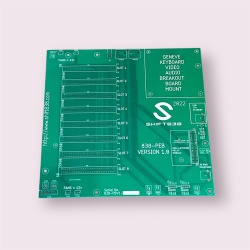Latest Products
-
 SHIFT838 99/22 GROM Extender
$12.00
SHIFT838 99/22 GROM Extender
$12.00 -
 838-IDE V3 White Limited Edition
$400.00
838-IDE V3 White Limited Edition
$400.00 -
 TI-99 IO Side-ort Breakout Board
$3.50
TI-99 IO Side-ort Breakout Board
$3.50 -
 838-PEB PCB
$60.00
838-PEB PCB
$60.00
Please note if ordering for a ColecoVision then select Tall Pins, if ordering to be used in a Coleco ADAM then be sure to select the ADAM adapter for pin options.
Please note I can fit up to 3 units in a USPS flat rate small box.
TI-99/4A uses normal pins.
All units are tested prior to being shipped.
Please allow one week build time as units are built and tested as ordered.
The F18A is a direct pin-compatible replacement for the TMS-9918A VDP Family that was used in many retro-computers and game consoles from the early to mid 1980’s. The F18A’s primary goal is to provide a pixel-perfect output video signal that can be used directly with a modern computer display.
Great effort has been put into making the F18A physically, electrically, and software compatible with the original 9918A VDP, so all existing software should run correctly on a system with an F18A installed.
For new software development, the F18A is programmed exactly like the 9918A, so any existing documentation, techniques, and development environments that work with the 9918A will also work with the F18A.
The F18A also provides many enhancements over the 9918A, and those features will be the focus of this documentation. Having a basic understanding of the 9918A will help understand this documentation, since there is a lot of information covered in the original datasheet and programmer’s guide (see links above) that might not be repeated here.Features
- 80-column (T80) mode.
- Position-based attributes for T80 mode, so each tile can have its own foreground and background color.
- 64 programmable 12-bit (4096) color palette registers.
- High-speed “data port mode” for fast palette register updating.
- Three enhanced color modes (ECM) that provide 1, 2, or 3 bits-per-pixel allowing 2, 4, or 8 colors per-pixel for each tile and sprite.
- 32-sprites on a line at once (can eliminate sprite flicker if software did not implement sprite-rotation).
- Each sprite can have its own size (8x8 or 16x16), and X/Y pattern flip.
- 30-column mode that provides 32x30 tiles (same as the NES).
- Two independent tile-layers, each with their own name, color, and pattern table base addresses.
- Per-tile attributes so each tile can have its own foreground and background color, priority over sprites, X/Y pattern flip, and transparency.
- Independent horizontal and vertical pixel-scrolling for each tile layer.
- Tile page sizes of 1x1, 2x1, 1x2, and 2x2 to support edge-to-edge pixel scrolling.
- Bitmap layer with programmable size from 1x1 to 256x192 pixels, pixel locatable, 4-colors per pixel, 16-colors per pixel “fat pixel” mode, sprite priority, and palette select.
- Programmable horizontal-line interrupt.
- Programmable signed increment value for the VDP Address Register.
- Ability to read all VDP Registers.
- Programmable 46-bit decimal counter with 10ns (nanosecond) precision (can count 18.2044 hours with 10ns accuracy).
- A 100MHz TMS9900-based “GPU” processor that can execute programs in VRAM, has full access to all VDP Registers, a high-speed DMA, and dedicated pixel-plotting and address instructions.
- Virtual scan-lines for a retro CRT look.
- VGA 640x480 60Hz video output.
The original F18A, or just “F18A”, was released in 2012 and continued to be available until late 2017. In total, around 550 F18A boards were produced. The F18A was physically larger than the DIP-40 package of the TMS-9918A IC, mostly due to manufacturing limitations of the time at the production quantities of the F18A.
Because the F18A is twice as wide as the 9918A, there were problems fitting the F18A into many of the various systems in which the F18A could be used. To accommodate some of the more popular systems, two variations of PCB-pins were used: a “tall pins” and “short pins” option was offered, as well as a custom adapter board for the Coleco ADAM computer. Even with these options, the F18A was still not able to be used in many systems due to its size.
Tested System Compatibility
The F18A has been installed in the following systems:
- TI-99/4A Home Computer (Needs Normal Pins)
- ColecoVison Game Console (1) (Needs Tall Pins)
- ColecoVision ADAM Computer (1) (Needs Normal Pins)
- NABU Home Computer (Needs Normal Pins)
- Please note that jumpers 1 and 4 need to be left open on the F18A for it to work correctly on the NABU
- Toshiba HX-10 MSX1 Computer
- Toshiba Pasopia-IQ MSX1 Computer
- JVC Victor HC-7 MSX1 Computer
- Yamaha CX5M MSX1 Computer
- SpectraVideo 328 Computer (1)
- Tomy Tutor (1)
- SEGA SG-1000 (2)
- SEGA SC-1000II (replaced a TMS9118 VDP)
- Telegames Personal Arcade
- Powertran Cortex
- Memotech 500 and 512 (2)
Note 1: These systems are known to have the original VDP soldered directly to the system circuit board, and will require desoldering the original VDP and a socket installed.
Note 2: The placement and orientation of the original VDP in these systems prevents the system case from being closed when the F18A is installed.
Note that all sales are final, no refunds will be given.
- Availability: Out of Stock
- Model: F18A












